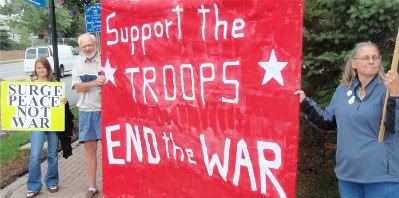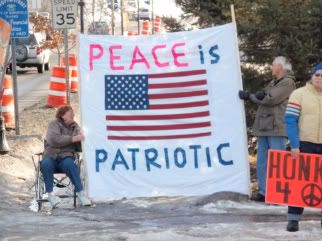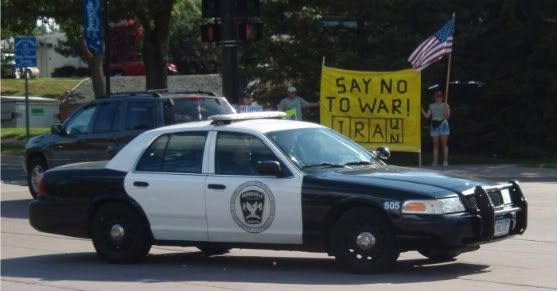Wednesday, July 8, 2009
IARP's New Website!
wasalaam,
Luke
Sunday, July 5, 2009
Iraqi refugees release captivating album online

Iraqi refugees release captivating album online
News Stories, 12 June 2009

DAMASCUS, Syria, June 11 (UNHCR) – A trio of refugee musicians from Iraq have released their first album on some of the world's leading music-sharing sites and have agreed to use the profits to help financially strapped compatriots in exile.
"Transitions," comprising 15 tracks put together by Salim Salem, Abdel Mounem Ahmad and Fadi Fares Aziz with the support of the UN refugee agency, made its online debut Thursday on iTunes, Napster, Amazon, Amie Street, IMVU, lala, ShockHound, Rhapsody and emusic.
The three used their collective experiences of life as refugees, their transitions and the uncertainty of exile as inspiration for their captivating and calming music – a mix of ancient and modern that highlights the richness and diversity of the Iraqi musical repertoire. Salim plays the oud (lute), Abdel Mounem the ney (pan flute) and Fadi the qanun, a type of zipher.
They met in Damascus after fleeing the violence in Iraq. The three men often talked about recording Iraqi music that would reach an international audience. "When I arrived in Syria, my oud was my only luggage as a refugee. I had left my country behind, but my music spoke about nothing else," recalls Salim.
His dream to record music with Abdel Mounem and Fadi turned to reality when the UNHCR office in Damascus became involved as part of its "Express Yourself" campaign, launched in 2007 to give talented Iraqi refugees in Syria a platform to express themselves artistically.
UNHCR's Damascus office contacted the iTunes last month and asked them to market the music. They referred the agency to TuneCore, a United States-based music distribution company. TuneCore then sent the music to all its partners – including iTunes – for sale. The album was recorded in Damascus.
Philippe Leclerc, UNHCR's acting representative in Syria, welcomed the release of the album. "Iraqi talent is alive. We need to continue to support it and help Iraqi refugees living in exile," he said. "Iraqi society is facing major challenges today and we hope that this music will allow people all over the world to become closer to Iraqi culture while supporting Iraqi refugees."
Salim, Abdel Mounem and Fadi have all agreed to donate the profits to a UNHCR-run financial assistance programme that provides a lifeline for some 12,000 Iraqi refugee families unable to work legally in Syria, or lacking savings. Every track downloaded will mean 60 US cents for the programme.
"This solidarity will mean a lot, not only to the refugees but also to the humanitarian aid workers who are supporting this operation," said Sybella Wilkes, a UNHCR public information officer in Damascus.
Meanwhile, "Transitions" might become the only album recorded by the three men. While Salim remains a refugee in Damascus, Fadi was recently resettled in the United States with UNHCR help. Abdel Mounem has returned to Baghdad, once a musical centre of the Arab world, though he will play a special World Refuge Day concert in Damascus next Wednesday with Salim.
"I have returned to Iraq, determined to make my future here," Abdel said. "I am part of a resistance that promotes passion for music and peace. Culture and art are still part of the Iraqi identity. Such an ingrained, deep-rooted and ancient civilisation cannot be erased in a few years."
Salim is not ready to go back, but he believes things are improving in Iraq. "During the past year, I have seen music blossoming again in Iraq," said the oud player. "We would like to dedicate this album to all Iraqis around the world, to all the people who have made this project possible and to all fine listeners of Oriental music," he added.
By Dalia Al-Achi in Damascus, Syria
We are not disturbing the peace, we are disturbing the war
"We are not disturbing the peace, we are disturbing the war."
by Bjorn in MN
Thu Jul 02, 2009 at 09:46:11 PM PDT
Every Tuesday afternoon a small group of peace activists stand at the busy intersection of Burnsville Parkway and Nicolet Avenue , just a couple blocks away from the largest park and ride in the southern suburbs and outside the offices of Republican Congressman John Kline. For over two years now they have been coming to this spot in Burnsville , Minnesota to exercise their first amendment right to speak out against the war that Kline is a big supporter of. Over the course of those two years the peace vigil has received a great reception from many in the community and the protesters have received a large number of honks of support from those who pass by.


The Burnsville Police Department never seemed to like the idea of a peace vigil outside Kline's office however. From early on, it appears they needed to find a way to build a case to show that these people represent a threat to public safety.

The police decided to target a sign that was frequently held at the peace vigil that said "Honk for Peace". There is a law on the books which states that a person can not honk their horn for non-emergency purposes. It is a law that the Burnsville Police were not enforcing in the past, but now people were honking in support of peace and so it was time for a police crackdown.
Officers approached the participants at the vigil and told them that their "Honk for Peace" signs were encouraging an illegal act and if anyone honked the participants of the vigil would be held responsible. Of course there is no legal precedence for prosecuting protesters when people honk in support of them and so the participants of the vigil asked the police to show them the law that prevented them from holding their signs at the intersection. In the words of Coleen Rowley who is a regular participant at the Burnsville peace vigil, "we're not disturbing the peace, we're disturbing the war." The city of Burnsville had no laws on the books prohibiting anyone from disturbing the war however, and so they tried a different tactic in an attempt to get the protesters to go away. Instead of targeting the protesters, they were going to target the motorists who expressed their support with honks.

Police set up a dragnet at the intersection one afternoon to catch and ticket those who honked while going through the intersection. Over the course of a few weeks, they were able to ticket two or three different motorists. One of those ticketed was very supportive of the vigil's message but was also very upset that the vigil continued after the activists knew police were going to be pulling people over and ticketing them. The vigil participants felt very strongly that the first amendment not only allowed them to be at the intersection but also allowed people like this woman to show their support. Eventually the Burnsville woman who was ticketed sought and received the help of ACLU volunteer attorney Howard Bass.
Bass took up the case to defend our first amendment rights and after a several month battle, he was able to get the city of Burnsville to not only drop the charges but also get a consent decree issued which affirmed the right of all motorists to honk for peace. The police agreed that they would stop pulling people over for honking and allow the peace vigil to continue. It seemed free speech had prevailed and the participants of the vigil breathed a sigh of relief.
For several weeks the vigils went on without police harassment, but then on June 23rd the police showed up and started photographing the peace vigil participants. Greg Skog who is a participant in the vigil had his camera along so he took some pictures of the police to document their actions and then asked them what was wrong. The police said they knew about the consent decree and they were not going to be pulling anyone over, but they did not explain what anyone at the vigil was doing wrong or why they were being photographed.
When the vigil participants arrived on June 30th, the police were already waiting for them. At least one officer was in the parking lot of Kline's offices monitoring the peace activists the entire time. Officers appeared to be recording driver's license numbers on notepads.
It is unclear what kind of case the police are trying to build, what is clear is that this peace group has been at the intersection for nearly two years now and every single week they have remained very peaceful and law abiding. The Burnsville Police Department is targeting and harrassing peaceful protesters and their community supporters by using intimidation tactics, but fortunately the participants in the vigil are not going to give up on their free speech rights. They are intending to be at that intersection every week, rain or shine, until the wars come to an end. Let's give them our support.
A special thanks to Coleen Rowley, Sue Skog and Greg Skog for their assistance with this post.
Tags: Peace vigil, Minnesota, war, protests, John Kline,
Friday, July 3, 2009
New art store opens in St. Paul on July 4th with exhibition of Iraqi and international student art
Chukouma, the owner of the new shop, says, “Some art works exhibited in the store are from Iraqis and some from international students at a local school... The art will show the international talents of the students and hopefully people will come due to curiosity of what the art is about.” The Wolves Head is located at 1665 Grand Avenue, Saint Paul and is open from 2:00pm to 6:00pm this Saturday, July 4th. Its hours are 10:00am to10:00pm on Sunday and 10:00am to 7:00pm during the week, and the show will be open until July 25th.
The Iraqi paintings will be available for sale. The proceeds transferred to the artists are then shared with their sponsoring organization in Iraq, the Muslim Peacemaker Teams. On Sunday evening at 7:00pm there will be an informal, free jazz concert by local guitarist Rick Figucroa. Visitors to the Wolves Head may also sign up for future art classes such as jewelry making, bead weaving, quilting, a men’s sewing circle, and other fiber arts.
IARP Art Director Jessie Witte says, “The show will be a unique combination of artists in the community getting together.”
The Iraqi Art Project, a program of IARP, helps bridge American communities with Iraqi artists to enhance cultural exchange between the two peoples. It promotes a deeper understanding among Americans about the Iraqi culture, people and land through the transformative power of art.
For more information please contact:
Luke Wilcox, IARP Communications Director, at:
IARP’s website: http://reconciliationproject.org



